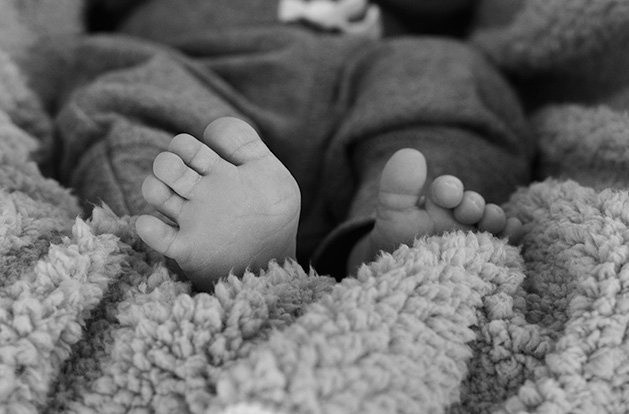
M Health Fairview: Woodwinds Hospital has spent the last few years going through a bunch of changes in maternity care. It is one of the few hospitals in the Twin Cities where patients can choose among providers like obstetricians, certified nurse midwives or family medicine practitioners who specialize in obstetrics.
“We have a good mix of all three of them that deliver there,” Jill Branovsky, maternity care clinic director, says. “It’s about 60 percent obstetricians, 25 percent certified nurse midwives and 15 percent family practice providers.”
And a relatively unique offering at Woodwinds is water births.
“About eight percent of our deliveries are water births,” Branovsky says. “The midwives are the providers for that.”
It’s all part of a series of changes over the last four years (though water births have been available prior to the big changes). Two major events brought a sudden influx of patients to the maternity ward. In 2015, Woodwinds added a 24/7 obstetrics position to their care team; that means an OB is on staff 24/7.
“That made a difference because that safety feature is there. If it’s a midwife or different OB group and the primary provider isn’t in the hospital, there’s someone who can start an emergency C-section” or provide other specialized care, says Dr. Jill France, who practices at Woodwinds.
In 2017, St Joseph’s Hospital shut down its maternity ward. The teaching hospital transferred its residency program to Woodwinds.
“We saw a huge boom in patients at that point,” Branovsky says. “And we had even better improved care by having that resident physician in the building 24 hours a day.”
With more doctors on hand, Woodwinds is now working on how best to serve their pre-term babies.
“We have really been focusing on our pre-term babies or babies that need that higher level of care,” Branovsky says. “We’re called a special care nursery. That means we’re caring for babies who are 36 weeks and up. We’ve been adding services such as CPAP, and what that does is provides respiratory breathing assistance after delivery. We added that a little over a year ago and that has decreased the number of babies who are transferred [to a different care location]. Mom and baby don’t have to be separated.”
Neonatologists from the University of Minnesota are also in attendance at the hospital. “They are engaged in keeping moms and babies together,” Branovsky says.

Preparing for Birth
To make the experience of labor and delivery less nervewracking for first-time parents, Branovsky suggests attending childbirth classes. Woodwinds partners with Amma Parenting, a local provider of childbirth, new-parent and other classes and workshops.
“Fewer people are doing childbirth classes and breastfeeding classes because there’s so much online,” Branovsky says. “As a result, there are people who aren’t as well prepared because they haven’t had that education. We want to stress that childbirth classes are good sources for education.”
She says while watching videos online can be informative, it’s difficult for people to ask questions. Attending in-person classes can help parents make a birth plan, and assuage any concerns.
Postpartum Care
Woodwinds offers screening for postpartum depression. The initial test is a two-question screening.
“It asks about the last few weeks regarding their mental status,” Branovsky says. “If either of those are answered with a yes, there is a lengthier survey that the mother does. If it gets into that higher category, we have care managers who are formerly social workers who visit with the mother to provide resources, and it’s communicated to providers to follow up with the mother.”
Woodwinds also has connections with several support groups to which they refer patients. But if the issue is urgent, they consult with psychiatrists from St. Joseph’s over the phone or in person.
Both France and Branovsky stress that mothers should answer the postpartum survey carefully and without fear that they will be separated from their child.
“I can understand the thought process,” France says. “But you have to trust your provider and be in a comfortable place. If there’s mutual trust and respect, honesty gets you the best treatment.”
Branovsky encourages patients to bring up any concerns.
“Ask questions,” she says. “If they have the survey and they’re worried about that, they can ask, ‘What’s the reasoning behind why you’re asking me to do this? What would happen if I answer yes?’”
But post-partum depression doesn’t only affect moms. Branovsky says Woodwinds offers support groups for dads after delivery as well.
There are early childhood developmental specialists. “We call it the Welcome Baby Program and they go over normal development. We also have a New Parent Connection that meets at Woodwinds once a week that provides peer and feeding support,” Branovksy says.
If parents have concerns about their baby, Woodwinds has additional home visit services.
“We have home care nurses who can medically assess babies and moms,” Branovsky says.
France says the home health visit is under utilized.
“Not enough people take access to having a home health visit,” France says. “It’s a good resource for parents to have the medical professional come in and watch how the baby is feeding and talk to Mom about how her mental health is doing—to help verify if there is depression or even just baby blues so we can identify things earlier. I wish more people would take advantage of it.” Home health nurses also asses other health measures for moms, like blood pressure.

Feeding & Lactation Resources
La Leche League of South Washington County
Meets at Woodwinds near fireplace on lower level on the second Tuesday of each month at 7 p.m.
New Parent Connection
Woodwinds Health Campus, Auditorium C. No registration or fee required. Birth to 3 months: Tuesdays, 12:30 to 1:30 p.m. Ages 3 to 6+ months: Tuesdays, 4 to 5 p.m.
Pregnancy and Infant Loss Support Group
The Nickolas’ Gift Foundation; call Dawn at 715.760.1966.









